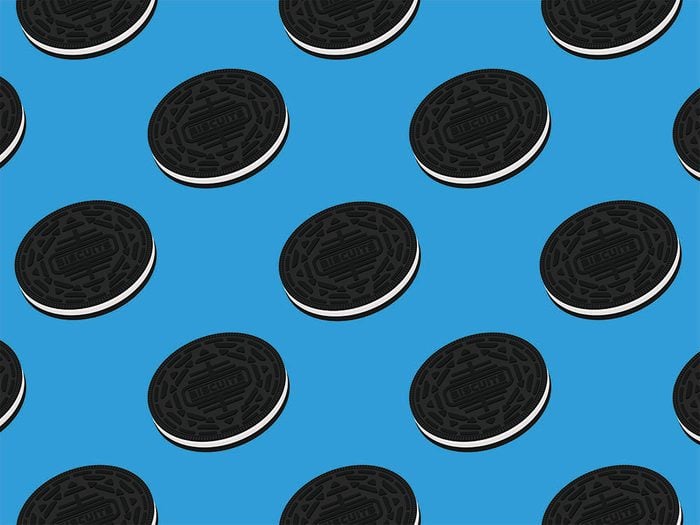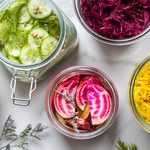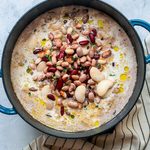This Nutrition Expert Is Encouraging You to Eat the Cookie

Abby Langer, dietician and author of Good Food, Bad Diet, shares how to improve your relationship with food so you can eat what you want and still feel good.
Abby Langer loves Oreos. Those black-and-white discs of hard and soft, vanilla and chocolate—they’ve no rival as far as Langer, a dietitian, is concerned. When the body craves an Oreo, an apple won’t do.
When a client tells her that they can’t stop thinking about Oreos with—as any careful checker of food labels would know — 120 calories for two cookies and commonly maligned ingredients like sugar, high fructose corn syrup and artificial flavours, Langer’s response: Just eat the @#$%ing Oreo.
The expletive is hers. She likes a good swearword for emphasis. She uses them often in her new book Good Food, Bad Diet, in which she argues that if people try to ignore all their cravings, they’ll be “miserable AF.” It isn’t a sign of weakness to overeat sometimes, she says. “Trust your body. It isn’t going to end in disaster,” she writes.
In her over 21 years of working as a dietitian in private practice and hospitals in Toronto, Langer met hundreds of clients who have counted calories and calculated macronutrients, and washed them down with guilt and shame, only to repeat the cycle.
In her book, Langer takes on what she calls “diet culture”— the concept that, through restrictive or “clean” eating, we can achieve thinness and, with it, happiness. “Diet culture grabs us when we’re young and tells us that fatter equals lesser and thinner equals better,” she writes. “And we’re scared like hell of being lesser, so we’ll do just about anything to be—and stay—thin.”
But that harms people, women especially, she says. She believes that women should be comfortable with what their bodies look like, but instead tend to berate themselves for how they look and what they eat. Food has become associated with guilt, shame and feelings of lack of control, writes Langer, who lives in Toronto. As a result, women will put themselves through “psychological, physical and emotional abuse” to stay thin and appear young, she writes.
Her book addresses the psychology around eating, as well as the ever-changing state of science about what qualifies as “good food.” Her philosophy is that no food should be off-limits all the time. It’s better to make peace with the foods we love, replace the ultra-processed ones that we don’t, and eat whole or minimally processed foods when we can.
“This book is NOT a diet book,” she writes in the introduction.
At the same time, one could argue that it is kind of a diet book. There’s a contradiction right on the cover: Langer aims to arm readers with the habits they need to “ditch diet culture” and lose weight” while fixing their relationship with food forever.
I spoke with Langer about this conflict, and the work that goes into building a shame-free relationship with food while maintaining a healthy weight.
(Related: This Is the Worst Diet Advice Nutritionists Have Ever Heard)
Why did you want to write this book now?
I’ve seen so many people who are confused about how and what they should eat, and people who feel compelled to go on one diet after the other. In my practice, I always ask people, ‘how did you grow up? And how is food and eating talked about in your family?’ People don’t often go into the past when they talk about nutrition—they just tell people what to eat. So I wrote the book to clear up confusion about nutrition, yes. But I also wanted people to take a look at the questions of why—why do they feel this way about food and nutrition? Why do they feel compelled to punish themselves over and over again? I wanted to be able to change that ‘why’ for people. You can’t make change if you don’t change your negative core beliefs [about food].
Right in the subtitle of your book, there’s a seeming contradiction in goals: you’re challenging diet culture, but also giving people tools to lose weight. Do you think that’s contradictory?
It was my decision to put ‘lose weight’ in the subtitle and I did get a lot of shit for it from anti-diet activists. My publisher was happy. But there are people who think you can’t reject diet culture and still promote weight loss. I believe that you can. You can lose weight in a healthy way without submitting to diet culture.
I feel like if I don’t recognize those people who don’t feel comfortable and want to lose weight, it’s an elephant in the room. Who’s going to help those people? I can’t say to them that their desire to lose weight is invalid. There’s always going be someone who really does want to lose weight. That said, at the very beginning of the book, it says that this isn’t a weight loss book. I’m not going to give you a meal plan. I’m not going to give you a grocery list. I’m not going to tell you what and what not to eat. You may lose weight, but it will be because of behaviour change. You may not lose weight at all.
I firmly believe that there’s a grey area—something in between strict dieting and intuitive eating. Most of the people who I’ve seen who want to lose weight fall somewhere in the middle and they do best in the middle. They want some structure. And they want their desire to lose weight to be acknowledged. A lot of people want to lose weight, and I support them—unless they have a medical reason why they shouldn’t (such as an eating disorder). But I want to teach them how to do it properly.
(Related: These Are the Only 2 Diets Most People Are Able to Maintain Long-Term)
You write about the idea of high-value eating. This is where Oreos come in—you write that they are sometimes a high-value food, which goes against much of nutrition dogma. How can ultra-processed cookies fit into a nutritious diet?
I love Oreos, oh my god. I always refer to Oreos in everything I write. Here’s why they are a high-value food: food is meant to be enjoyed. But it’s devolved, in my opinion, into a cultural idea that food is something to feel shameful about. We’ve been taught that it’s not okay to nourish yourself emotionally with food.
But food nourishes physically and emotionally. And that’s okay. Oreos are my example. They are a high-value food sometimes because sometimes I need an Oreo. Food is meant to make us feel good. It’s not only just for fuel. There’s food for pleasure too.
Now if food is the only tool in your toolbox for coping with difficult situations, you need more tools in your toolbox. People gloss over the work of delving into their past and figuring out where their feelings around food and eating come from. And rightly so because it’s dark. It can be really, really hard and you may need a therapist to help you through it. But I truly believe that there is no meaningful lasting change if you don’t get to the why of why you are eating, and why you have those negative core beliefs.
There’s one question you ask readers to ask themselves, and it made me pause because I think the answer will be challenging for many readers, me included. You ask: “Are you willing to accept your body at its natural comfortable weight if it meant that you didn’t have to play tug of war with it anymore?” Do you think most people are willing to accept that?
Once people understand the financial, the social, the emotional and the physical cost benefit of all those things they’re doing to lose whatever weight they think they need to lose, I think they will find it easier to answer that question. I’ve had clients who count calories, and they’re just so focused that they don’t even notice it. It’s like they’ve been doing this so long they don’t understand the impact of it on their life. But living a life that doesn’t involve punishment and berating yourself every day and starving or whatnot. You can do this for so long that you don’t understand the impact of it on your life. When you stop and you think about how it’s impacting you and how it ripples out to your children, your partner, your relationships and your mood — all of that — is it worth it? Once people ask themselves those questions, it’s a hard pill to swallow.
You have two daughters, ages 10 and 13. I’ve watched you on social media, calling out their favourite clothing companies for using only very thin models. How do you manage food and body image in your family?
Everybody comes in a different shape and a different size, and we’re all different. In our house, for example, I won’t let the girls use the word “fat” as derogatory. It’s horrible how “fat” has become such an insult now. I think we need to teach them healthy eating behaviours and model the behaviours ourselves. I had a girl in my office who was eight years old and she wouldn’t eat. Her mother had been dieting her whole life. The little girl internalized those messages. When kids hear the message of ‘I’m not thin, I’m not lovable,’ they internalize these messages. So we need to set a good example by not weighing ourselves all the time, or talking about fat or going on diets. You have to have these conversations with your kids. There’s only so much we can do for them, but we can send them into the world prepared. Kids as young as kindergarten show a preference for thin versus fat. That’s a learned behaviour.
(Related: 7 Things Doctors and Nutritionists Wish You Knew About Fasting and the Warrior Diet)
You write that stress affects our diets and cravings. This is a stressful time for the entire planet. I hear people worrying about weight gain, about comfort-eating junk food and skipping the gym. What do you say to people who’re struggling with food right now?
First of all, you need to take care of yourself emotionally, not just physically. We’re going through an unprecedented time and it’s stressful in so many ways—health, finances, everything. I tell people do what you have to do. There is no shame. Food does not play nice with guilt and shame. So get that out of the way. If you are occasionally putting your struggles into food, that’s understandable. But if you cope with stress only with food, then it’s time to get another tool to cope with it. Whether it’s being active or doing online therapy or speaking to a friend, or whatever you choose, there has to be a balance. There’s a lot of BS about pandemic weight gain going around. Take your foot off the gas for a minute because we’re all struggling. You just need to stay healthy. And if you eat an extra bag of chips or some cookies, please give yourself a break right now.
This interview has been condensed and edited for clarity.
Next: This Popular Diet Could Sabotage Your Health, According to a Nutritionist




